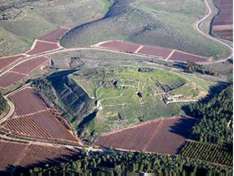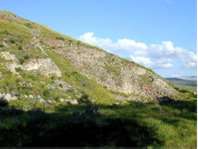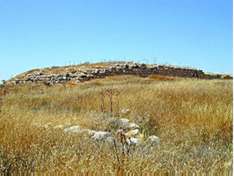Isaiah 33
This is the fifth of a series of woes (The word “woe” is used 7 times.)
Four of the five woes are directed at God’s chosen nation.
This fifth woe is the only one directed at a foreign
nation. This nation is
These woes run through chapters 28-33.
Chapter 32 speaks of righteous rulers in time that foreshadow the Messiah and his kingdom.
Isaiah 33:1
The Destroyer is
The Traitor is
They would not attack
8:13 “Now in the fourteenth year of king Hezekiah did Sennacherib king
of Assyria come up against all the fortified cities of Judah, and took them.
18:14 Hezekiah king of
18:15 Hezekiah gave [him] all the silver that was found in the house of
Yahweh, and in the treasures of the king's house.
18:16 At that time did Hezekiah
cut off [the gold from] the doors of the
No one dared to break a treaty
with Assyria or else
There
like an eschatological message in this that may be speaking to the ultimate
Destroyer and the first Traitor: Satan.
“When
you stop destroying” refers to the time when
This
is one of the themes of human power in the scriptures: It will ultimately cease.
No
matter how great the nation or empire (
These
empires must spend their time in their glory and their prime realizing that
this day of judgment at God’s direction by the hands of the other nations will
come.
Treat
you future conquerors righteously and justly.
33:2
This is a prayer of the people of
When
When all their treaties, trips to
At this final moment they cried
out to God. It was easy to wait on God
then. They had no other choice other
than to completely harden their heart.
God had often spoke through Isaiah
that when the people decided to call on God he would deliver them. An example of this promise is in Isaiah
30:18:
“Yet
the Lord longs to be gracious to you; he rises to show you compassion. For the Lord is a God of justice. Blessed are all who wait for him!”
Notice: Isaiah ministry is starting to produce fruit in the lives of his people and in the values of his nation.
Jeremiah
began to proclaim the word of God to the
people in 737 BC. It is now 701.
It has
taken more than 35 years. That is an
entire 40 year generation.
How
can Isaiah suddenly speak of deliverance for
The
people’s focus has changed. They were
trusting in nations up until this point.
When
the people’s focus changes then God’s response changes.
The
“woe” has gone from
God
was using Isaiah and the Assyrians to cause his people to cry out to him.
When
they cry out for help then
Trust
nations and be destroyed by God.
Trust
God and the oppressing nations will be destroyed.
Trust
nations = destruction
Trust
God = deliverance
“We long for you” or “We wait for you” indicates a change of faith focus.
No
longer are they looking for
The
result is “all of
A
greater future day is coming for
a)
Ezekiel 38, 39 – vs.
Gog and Magog
b)
Revelation 19 – vs.
Antichrist
Arm “Be our strength every morning” is literally “be our arm
every morning”
The
warrior roles up his sleeves or bares his arm for the battle.
Isaiah
51:9, “Awake, awake! Clothe yourself with strength, O arm of the
Lord; awake, as in days gone by, as in
generations of old.”
Isaiah
52:10, “The Lord will lay bare his holy
arm in the sight of all the nations, and all the ends of the earth will see the
salvation of our God.”
Isaiah
53:1, “Who has believed our message and
to whom has the arm of the Lord been revealed?
He grew up before him like a tender shoot, . . .”
Isaiah 63:5, “I
looked, but there was no one to help, I was appalled that no one gave support;
so my own arm worked salvation for me, and my own wrath sustained me.”
33:3
The
Lord is anticipated appearing for deliverance.
The
nations that where feared (both positively – sought to help, and negatively –
as a destroying enemy) are overthrown.
33:4
When
God has finished his quick destruction of the nations what they had taken as
plunder will be pounced on by men like young locust.
33:5
The
Lord’s victory will place him as clearly the supreme ruler over all.
From
his exalted position he will provide justice and righteousness to the people.
This
is similar to many other verses including Isaiah
32:15 where the Spirit is pour out from this exalted position of the
Lord. There the result is physical
productivity along with justice and righteousness. Righteousness is said to produce peace, which
results in quietness and confidence.
Righteousness ® Peace ® Confident Rest in the Lord
33:6
After
the Lord has defeated his enemies and been enthroned in glory he will provide
justice and righteousness.
This
justice and righteousness will be the foundation of civilization and culture at
that time (or, anytime it is allowed in any culture at anytime in history, including ours.)
The results here are said to be:
- Rich store of salvation
- Wisdom –
true and correct evaluation of situations, values and issues. This is subjective application of
objective knowledge.
- Knowledge
– recognition of correct information and possession of facts that are
true. These are the objective
things.
The
key to this treasure is:
FEAR
OF THE LORD.
The
fear of the Lord can also be describe both positively (seeking him for
protection) and negatively (knowing he has the power to overthrow you) just
like
Proverbs
1:7, “The fear of the Lord is the
beginning of knowledge, but fools despise wisdom and discipline.”
“Beginning”
does not mean you start there and leave it.
It means it is the first and controlling principle.
He is
the foundation or the cornerstone of 28:16.
33:7-16 These
verses (7-9) describes the situation
In
verses 10-16 we see God’s response to the crisis and to the people’s faith.
33:7-9
Heroes
and diplomats can not help.
The
warriors who were to defend the city are crying.
The
envoys who had gone to
Those
who signed the peace treaty with
God
said he would wait on the people of
Now
finally the people are waiting on God and they will be blessed.

 Approach
Ramp
Approach
Ramp
The
city was surrounded by two walls including a lower retaining wall. The
approach ramp led to the outer gatehouse which in turn led to the inner triple-chambered
gatehouse.
 Siege Ramp
Siege Ramp
The only siege ramp excavated in the ancient Near East is this one constructed
by the forces of Sennacherib in his 701 B.C. invasion of

At the end of the Judean monarchy, this governor's
residence was half an acre in size. It is the largest Iron Age structure
known in


Sennacherib’s Campaign to
from
33:9
Four fruitful places are barren:
§
§
§
§
33:10-16
This is God’s response to the people’s helplessness and their crying out to him.
He has been waiting for them.
33:10
Always after God tells you to “wait” there will come a time when he says “now” and he means “now”.
In this verse there are 3 “nows”
§ Now will I arise
§ Now will I be exalted
§ Now will I be lifted up
Only when we are focused on God and waiting will we hear his “now” clearly.
33:11-12
All of
33:13-16
These verses describe how each group of people respond to God’s interaction in history.
33:13
Gentiles
Isaiah was a prophet to the nations. Here he calls to the nations to pay attention and acknowledge the Lord.
Similar to Psalm 2:10-12, “Therefore, you kings, be wise; be warned, you rulers of the earth. Serve the Lord with fear and rejoice with
trembling. Kiss the Son, lest he be angry and you be destroyed in your
way, for his wrath can flare up in a moment.
Blessed are all who take refuge in him.”
33:14
Unrepented Jews in
These are Jews who had rejected Isaiah’s message and now have seen it come to pass.
Suddenly they realize they can not endure or live in the presence of this holy God.
Whenever God manifest himself the first thing people sense is a feeling of sinfulness.
God revealed in his glory our need for righteousness becomes the focus of our thoughts, then our statements and ultimately our actions.
See Isaiah’s reaction to God in Isaiah 6:5
God’s character and God’s power can not be separated.
33:15
Who can survive the appearance of God?
§ He who walks righteously
§ He who speaks what is right
§ He who rejects fain from extortion
§ He who keeps his hand from accepting bribes
§ He who stops his ears against plots of murder
§ He who shuts his eyes against contemplating evil
Psalm 15
“Lord, who may dwell in your sanctuary? Who may live on your holy hill?”
§ He whose walk is blameless
§ He who does what is righteous
§ He who speaks the truth
§ He who has no slander
§ He who does his neighbor no wrong
§ He who casts no slur
§ He who despises a vile man
§ He who honors those who fear the Lord
§ He who keeps his oath
§ He who lends his money without usury
§ He who does not accept a bribe
This man “will never be shaken.”
Psalm 24:3-6
“Who may ascend the hill of the Lord? Who may stand in his holy place?
§ He who has clean hands
§ He who has a pure heart
§ He who does not lift up his soul to an idol
§ He who does not swear by what is false
This man “will receive. . .
§ blessing from the Lord
§ vindication from God his Saviour
“Such is the generation of those who seek him”
33:16-22 - The blessed state of
the righteous man
33:23-24 – A contrast of our (
rigging, mast, spread we are unable to move the ship or help ourselves.
Then, an abundance of spoils will be divided.
Lame will help and sins forgiven.